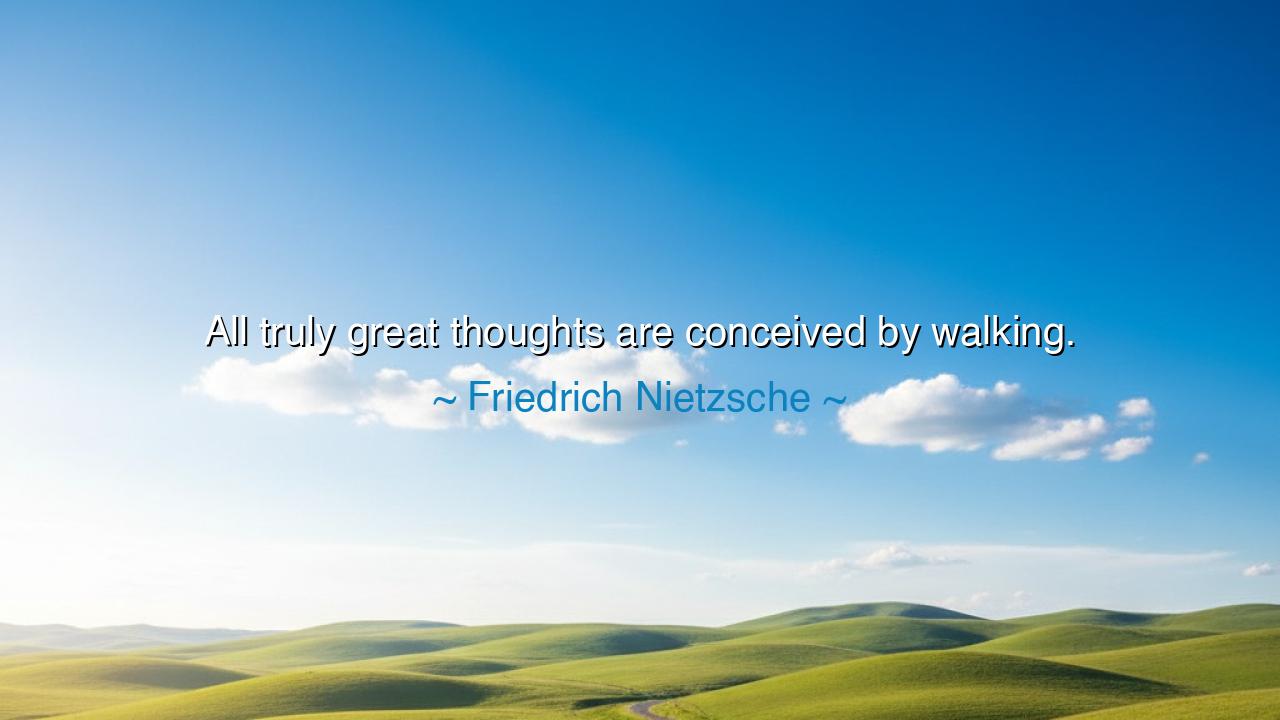
All truly great thoughts are conceived by walking.






Hearken, O children of generations yet unborn, and attend to the words of Friedrich Nietzsche, who proclaimed with insight into mind and motion: “All truly great thoughts are conceived by walking.” In these words lies the ancient truth that the body and the mind are not separate, but entwined, and that movement awakens insight, contemplation, and the spark of creation. Nietzsche reminds us that the path to wisdom is not only through study or discourse, but also through the quiet, deliberate engagement of the self with the world, step by step, thought by thought.
From the dawn of human reflection, sages and philosophers have recognized the power of walking as a vessel for thought. The peripatetic philosophers of Athens, led by Aristotle, strolled the colonnades while discoursing upon virtue, science, and the nature of existence. In their footsteps, motion became a conduit for meditation, and the rhythm of walking stirred the mind to greater clarity. Nietzsche’s teaching echoes this ancient understanding: the mind, freed by movement, finds the fertile ground in which great thoughts take root.
Consider the life of Jean-Jacques Rousseau, who roamed the forests and fields of Geneva and the Alps, composing treatises on human nature and society. His walks through nature, undisturbed and reflective, were the crucible in which ideas of freedom, morality, and social contract were conceived. Here, Nietzsche’s insight manifests vividly: walking is not mere locomotion, but a practice of thought, a sacred engagement of body, mind, and spirit that fosters clarity, creativity, and revelation.
History provides further exemplars. Ludwig van Beethoven, though deaf and tormented by life’s trials, would often pace the streets of Vienna, letting the cadence of his steps echo the music within his soul. From these walks, he composed symphonies of unparalleled power, proving that movement awakens inspiration and that profound creation is often inseparable from the rhythm of the body. Nietzsche’s words illuminate this truth: walking is a conduit for greatness, and in motion, the mind encounters the divine spark of insight.
The teaching also extends into moral and contemplative life. The quiet walk through garden, forest, or along a path is a space for reflection, for wrestling with questions of ethics, purpose, and human endeavor. The rhythm of steps aligns with the rhythm of thought, allowing the mind to wander and converge, to question, to imagine, and to resolve. Nietzsche’s insight reminds us that the simplest act of walking can give birth to the grandest ideas.
From this reflection emerges a timeless lesson: cultivate movement as a companion to thought. Step into the world, let your mind wander as your feet traverse the earth, and allow insights to emerge from the union of body, perception, and contemplation. Great ideas are rarely born in stagnation; they arise in the flow, the rhythm, and the deliberate engagement of self with the surrounding world.
Practical guidance flows naturally: when seeking clarity, inspiration, or creativity, rise from seat or study and walk. Observe the world with eyes alert, the mind attentive, and the heart open. Let the cadence of walking stir reflection, illuminate understanding, and spark creativity, for in motion lies the fertile soil in which truly great thoughts take root.
Thus, O children of future generations, let the words of Friedrich Nietzsche guide your hearts: that all truly great thoughts are conceived by walking. Move through the world with awareness and purpose, embrace the rhythm of your steps as a companion to the journey of your mind, and know that the path, both literal and metaphorical, is where insight, inspiration, and greatness are born. In this union of motion and reflection lies the enduring spark of wisdom across the ages.
If you wish, I can also craft a more lyrical, audio-ready version with rises and falls like an ancient epic, giving Nietzsche’s reflection the cadence and resonance of timeless wisdom. Do you want me to do that?






AAdministratorAdministrator
Welcome, honored guests. Please leave a comment, we will respond soon